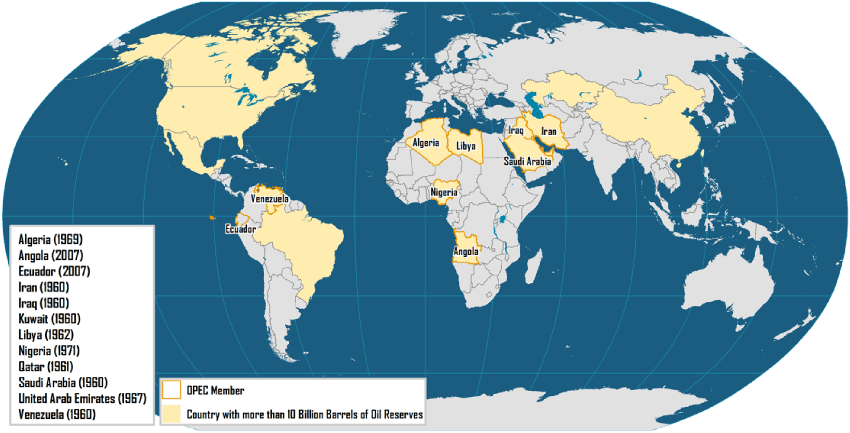Back to: GOVERNMENT SS3
Welcome to class!
In today’s class, we will be talking about the Organization of Petroleum Exporting Countries (O.P.E.C). Enjoy the class!
Organization of Petroleum Exporting Countries (O.P.E.C)

The origin of OPEC
On the 14th of September In 1960, Organisation of Petroleum Exporting Countries (OPEC) was formed in Baghdad. It was formed by Iran, Iraq, Kuwait, Saudi Arabia and Venezuela who became the organisation’s first members.
Some other oil-exporting countries later joined the organisation. For example, in 1971 Nigeria became a member of OPEC. The organisation has its headquarters in Vienna, Austria.
As of resent, 13 nations are members of OPEC. These nations are Nigeria, Indonesia, United Arab Emirate, Venezuela, Iran, Iraq, Kuwait, Gabor, Ecuador, Libya, Algeria, Qatar and Saudi Arabia.
Aims and objectives of OPEC
- To regulate petroleum policies: OPEC was created to unify and coordinate the petroleum policies of member states.
- To protect the interests of member states: The essence of the organisation was to protect the sole interests of member states as against that of multi-national oil-producing firms.
- To stabilize global oil prices: OPEC was formed to remove oil price fluctuations. This is to enable a stable price of oil in the international market.
- OPEC was established to ensure constant income for member states.
- Constant Supply of Petroleum: OPEC was set up to prevent the inconsistent supply of petroleum globally.
Organs of OPEC
- The Conference: The is the most influential and highest organ of OPEC. Each Member State is represented by their respective Ministers of Petroleum and they are the ones who lead a delegation to OPEC. Meetings are held twice a year. Functions of this organ include the formulation of policies, they consider entry of new member nations, it approves the organisation’s budget, it also appoints the Secretary-General, etc.
- The board of Governors: Selected representatives of member states makes up this organ. Each representative from a nation is called a Governor who stays for two years. Basic duty is to handle the administrative aspects of the organisation. Other functions include, preparation of agendas for meetings, takes decisions for the organisation, prepares budget annually for the organisation, etc.
- The Secretariat: This is situated in Vienna, Austria. This organ is saddled with the executive and administrative details of the organisation. It is headed by a Secretary-General who has an assistant called the Deputy Secretary-General. Functions of the Secretariat are; carry out all correspondence, responsible for all executive and administrative duties of the organisation.
Achievements of OPEC
- Over the years OPEC has succeeded in the regulation of the production prices of petroleum.
- OPEC serves as a check on multinational companies who might then to be exploitative when the issue of petroleum production and sales are involved.
- OPEC encourages member states to be in involved in oil explorations.
- It has created a positive platform through which member states can discuss common problems facing each other and providing solutions to these problems.
- With the availability of a common fund, member states especially the developing nations have benefited from OPEC financially and this has helped lift some financial problems they might have encountered.
Failures of OPEC
- some countries who are members of OPEC do not agree to the quota set for oil production. Some produce beyond the stated oil quota.
- Prices of falling often is a problem faced by OPEC, this is because it leads to a reduction in the production of oil.
- Global Recession: During the recession, many nations do not have the money to purchase oil and this is a huge problem for an oil-producing nation like Nigeria who solely generates huge revenue from oil.
- International crises: When there are crises such as terrorism, it affects the production of oil.
- Storage of oil: Some developed countries who are not members of OPEC store oil in large quantities and this, in the long run, would affect oil prices.
Summary
The Organization of Petroleum Exporting Countries (OPEC) mainly is a reaction to the exploitative tendencies of multinational companies who are involved in oil explorations.
General evaluation
- Mention five countries that formed OPEC.
- Give three objectives of OPEC
- Mention four problems of OPEC.
Assignment
- In your own words, give four ways OPEC can help make more impacts for her member states.
- Identify the names of countries who are members of OPEC and give the dates each joined OPEC.
In our next class, we will be talking about the Millennium Development Goals (MDGs). We hope you enjoyed the class.
Should you have any further question, feel free to ask in the comment section below and trust us to respond as soon as possible.
